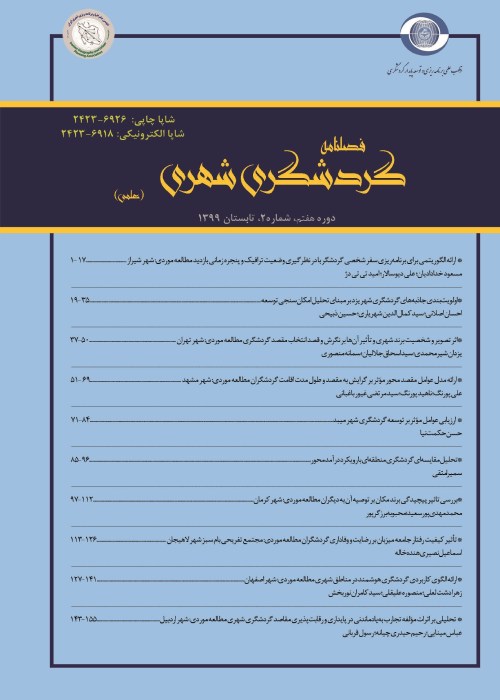Investigating the Effect of Factors Affecting the Intention to Travel of Tourists to Ramsar during the COVID-19 Pandemic
The risk of the Covid-19 pandemic is not limited to mortality but also brought unbearable psychological pressure to people. The researchers found that the perceived risk of disease outbreak exacerbates anxiety and other negative emotional behaviour that may negatively affect a tourist's intention to travel. Also, when faced with danger, tourists prefer to postpone their itineraries, re-evaluate their destination selection process, and reduce the perceived risk or cancel their travels. The effective Factors on tourists' intention to travel during the Covid-19 can be referred to as perceived self-efficacy, perception of covid-19, cognitive perception of risk, and emotional perception of risk. Numerous studies show that during this period, most travel behaviours are limited and people are less likely to travel or travel with more confidence. But this has been the opposite for Ramsar, which is known as a tourist destination. Despite the critical situation in Mazandaran province, especially this tourist destination, a huge number of tourists entered the city. Therefore, the present study seeks to explain why this issue by examining the effect of tourist’s perceived self-efficacy, cognitive perception and emotional perception of travel risk on their behavioural intention to travel to Ramsar during the outbreak of Covid-19.
The present study is explanatory quantitative research based on Partial Least Squares Structural Equation Modeling. The statistical population of the study was the tourists who came to Ramsar during the Covid-19. The number of statistical samples was estimated at 440 people. Data were collected through a web-based questionnaire. The questionnaire consisted of two parts: demographic and specialized questions. In the specialized section, four to five items were used to measure each variable: the tourist self-efficacy towards Covid-19 (4 items), the perception of becoming infected with Covid-19 (5 items), the emotional perception of risk (4 items), the cognitive perception of risk (4 items) and the behavioural intention (5 items). The validity of the questionnaire was confirmed using construct, convergent, divergent, and diagnostic validity, and also its reliability was confirmed by composite reliability and pre-test of 30 prototypes, based on Cronbach's alpha test. Data classification and analysis were performed through SPSS25 and SmartPLS3.
The research findings showed that the tourist emotional perception of risk was higher than other variables. In testing hypotheses, from the tourists' point of view, the tourist self-efficacy of Covid-19 has a negative effect on their perception of Covid-19 (t-Value = 6.842 and β = -0.498). hence, Hypothesis H1 is confirmed. Tourists' perception of becoming infected with Covid-19 has a positive and direct effect on the emotional perception of travel risk (t-Value = 2.883 and β = 0.306), hence the H2 hypothesis is confirmed. Tourists' perception of getting infected by Covid-19 has a positive and direct effect on the cognitive perception of risk (t-Value = 4.790 and β = 0.444), hence the H3 hypothesis is confirmed. Tourists' perception of being infected with Covid-19 has a positive and direct effect on their behavioural intention when traveling to Ramsar (t-Value = 2.232 and β = 0.288), hence the H4 hypothesis is confirmed to be 96 1.96. Tourist emotional perception of risk has a positive and direct effect on their behavioural intention when traveling to Ramsar (t-Value = 3.155 and β = 0.324), hence the H5 hypothesis is confirmed. Tourists cognitive perception of risk has a positive and direct effect on their behavioural intention when traveling to Ramsar (t-Value = 2.035 and β = 0.271), hence the H6 hypothesis is confirmed.
Finally, the present study examines the effects of Covid-19 on changes in behavioural patterns among tourists and shows that given the global warning about recurrence and emergence of infectious diseases such as Covid-19 and the awareness of managers and planners about such diseases, it is necessary to study the perceptions of risk and new tendencies of the travel pattern to facilitate the possibility of planning and compiling appropriate strategies and actions for similar events. Regarding the planning and presentation of strategies, Ramsar destination management just pursues the goals of the government and Ministry of Health and Medical Education, to reduce the spread of the virus in the city, so the issue of tourism is their last priority. In order to tourism be able to return to its original condition quickly, and according to these research findings (which was found that tourist emotional perception of risk (i.e., tourists' concerns in different dimensions) is higher than other variables), they should focus on reducing the travel risk perception of tourists and the Covid-19 threat through implementing the strategy of "travel communications based on Covid-19" in Ramsar.
- حق عضویت دریافتی صرف حمایت از نشریات عضو و نگهداری، تکمیل و توسعه مگیران میشود.
- پرداخت حق اشتراک و دانلود مقالات اجازه بازنشر آن در سایر رسانههای چاپی و دیجیتال را به کاربر نمیدهد.




